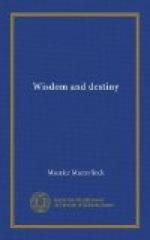In these terms does a sage describe a sage’s happiness; but is it true that the happiness of Marcus Aurelius, as of Renan himself, arose only from the return of joy that followed the renouncement of joy, and from the enchantment of the disenchanted? For then were it better that wisdom be less, that we be the less disenchanted. But what can the wisdom desire that declares itself thus disenchanted? Was it not truth that it sought? and is there a truth that can stifle the love of truth in the depths of a loyal heart? The truth that has taught you that man is wicked and nature unjust; that justice is futile, and love without power, has indeed taught you nothing if it have not at the same time revealed a truth that is greater still, one that throws on these disillusions a light more brilliant, more ample, than the myriad flickering beams it has quenched all around you, For there lurks unspeakable pride, and pride of the poorest kind, in thus declaring ourselves satisfied because we can find satisfaction in nothing that is. Such satisfaction, in truth, is discontent only, too sluggish to lift its head; and they only are discontented who no longer would understand.
Does not the man who conceives it his duty to forswear all happiness renounce something as well that, as yet, has not turned into happiness? And besides, what are the joys to which we bid this somewhat affected farewell? It must surely be right to discard all happiness injurious to others; but happiness that injures others will not long wear the semblance of happiness in the eyes of the sage. And when his wisdom at length has revealed the profounder joys, will it not be in all unconsciousness that he renounces those of lesser worth?
Let us never put faith in the wisdom or gladness that is based on contempt of a single existing thing; for contempt and renouncement, its sickly offspring, offer asylum to none but the weak and the aged. We have only the right to scorn a joy when such scorn is wholly unconscious. But so long as we listen to the voice of contempt or renouncement, so long as we suffer these to flood our heart with bitterness, so long must the joy we discard be a joy that we still desire.
We must beware lest there enter our soul certain parasitic virtues. And renouncement, often, is only a parasite. Even if it do not enfeeble our inward life, it must inevitably bring disquiet. Just as bees cease from work at the approach of an intruder into their hive, so will the virtues and strength of the soul into which contempt or renouncement has entered, forsake all their tasks, and eagerly flock round the curious guest that has come in the wake of pride; for so long as renouncement be conscious, so long will the happiness found therein have its origin truly in pride. And he who is bent on renouncement had best, first of all, forswear the delights of pride, for these are wholly vain and wholly deceptive.




